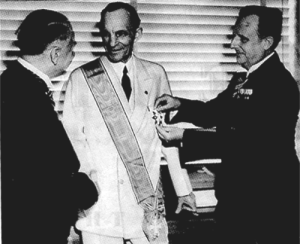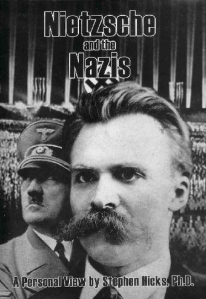The capitalist class and its ideologues – ‘hard’ and ‘soft’ power

German diplomats award Henry Ford, centre, their nation’s highest decoration for foreigners, the Grand Cross of the German Eagle, July 1938

John Heartfield, ‘The Meaning of the Hitler Salute: Little man asks for big gifts. Motto: Millions Stand Behind Me!’ Allgemeine Illustrierte Zeitung, 16.10.32
In What Direction Is Empirio-criticism Developing?
We judge a person not by what he says or thinks of himself but by his actions. And we must judge philosophers not by the labels they give themselves (“positivism”, the philosophy of “pure experience”, “monism” or “empirio-monism”, the “philosophy of natural science”, etc.) but by how they actually settle fundamental theoretical questions, by their associates, by what they are teaching and by what they have taught their disciples and followers.
V.I.Lenin, Materialism and Empirio-criticism: Critical Comments on a Reactionary Philosophy, Progress Publishers, Moscow, 1975, 199
*
The ‘fundamental theoretical question’ that Lenin unceasingly drove at in Materialism and Empirio-criticism, which underlies all other questions, is ‘Which takes precedence over or which is the product of the other – objective reality (matter) or consciousness/thought?
*

Heidegger, middle of 2nd row, on his way to give his first address as Rektor of the University of Freiburg, 27.05.33. He joined the Nazi party on the 1st of May.

Heidegger (indicated by a cross), in his capacity as Rektor of the University of Freiburg, at a public demonstration of support for Nazism by German professors on 11.11.33 in Leipzig.
Part six/to be continued…
Full text of Lenin’s book at Marxists Internet Archive
Highly recommended: ‘Ford and GM Scrutinised for Alleged Nazi Collaboration’ at
http://www.washingtonpost.com/wp-srv/national/daily/nov98/nazicars30.htm
Images: top left, top right/2nd row left, 2nd row right/below that/below that/below that/bottom image





Ah, jah… Deutschland & Co.
Germany, the insatiable country which gave the world a few WWs, a cohort of philosophers desperately attempting to fit the human spirit in their machinist thinking, allying with whosoever for as long as needed, just to turn against the same should they fancy so, shamelessly expecting to be listened to as a leader by those whom they previously nearly destroyed…
As I kept saying so, the world is stupid, spineless and digestion addicted…
I remember when still living under Ceausescu’s democracy, that the hospital where I worked at the time shared a common steam pipe with a neighbouring clothes factory. We used it for heating, they used it for powering their ironing machines. A particularly cold winter ( -20 -25° C ) demanded an increased quantity of fuel to produce the steam, which was unavailable before the Romanian “revolution”. Unexpectedly, one of the regional party secretaries showed up, demanding that the hospital shut down the heating, because the factory can’t iron the clothes to be exported to Western Germany. We told him that this would endanger the health of mothers and newborns on the 10th and 11th floors of the hospital. He replied with a threatening tone that he doesn’t care at all, and that the export production is more important. The technical management obeyed, which left the aforementioned wards with temperatures around 5 – 7°C… How many newbornes died as a result of subsequent illnessess, we don’t know exactly. Yes, communist countries seem to have been Germany’s sweatshops at that time. Fair enough isn’t it?
First they ruin a continent, then use it as a cheap labour camp enjoying a “well deserved” Marshall Plan from their American buddies!?
QED…
LikeLike
Hello Moshe, thank you for your comment. Obviously the events of the two world wars – particularly the second – arouse the deepest emotions. I believe that both those wars were generated, as was the ‘Great Depression’, by the unwilled dynamics of capitalism (fundamentally, in my view, they were fought over the re-division of areas of global exploitation, the second war continuing issues unresolved from the first) – the starkest examples of objective reality determining and reflected in consciousness and thought.
My intention in my post was not to imply that German philosophy equals fascism, that Germans are fascists, rather, using Germany as an example, to point to how the capitalist class functions – their power and domination ‘democratically’ concealed for as long as they can maintain this front (for example, in their philosophy, an element of their ideology) yet employing violence, up to and including the most extreme violence and brutality, if and when necessary to maintain their control (fascism and total war). Trotsky wrote an excellent book on the rise of fascism in Germany (he defined fascism as capitalism in extremis).
Particularly, I wanted the above to exemplify Lenin’s words – that we judge (and that we should judge) a person not by what he or she thinks or says of their self, not by what they want us to think of them (e.g. to be overawed by their mastery of philosophical ‘isms’), but by what they do – the quality of what they say, write and teach, by their associates, by their class position (why do they hold that position?) and especially by their position on the most fundamental question re- the relationship between objective reality and consciousness or thought.
The Marshall Plan was not motivated by humanitarian generosity but by the intention of preventing social collapse leading to revolution. As Marshall stated in 1947 ‘The modern system of the division of labor upon which the exchange of products is based is in danger of breaking down. …Aside from the demoralizing effect on the world at large and the possibilities of disturbances arising as a result of the desperation of the people concerned, the consequences to the economy of the United States should be apparent to all.’ (Wikipedia)
I hope you might read the article on the American companies Ford and GM which so well exemplifies the ruthlessness of the major players of the capitalist class and their international orientation. Best wishes, Phil
LikeLike
Hi Phil. I shall hope to have properly understood your thoughts and their intentions. Nevertheless, I took upon myself the philosopher’s right to amplify details thought to have sunk deeper within my developing understanding of life, influenced obviously by having lived on both sides of their fences, my difficulties in accepting existing systems stemming exactly from this; a curse lurking behind all analysis of ideas and events, leading to the becoming of pariahs, condemned sometimes to become Chomskys and Rands, paradoxically criticising the very systems which offered them shelter from the vicissitudes of the systems they absconded…
I fully subscribe to consequential arrival of WW2 from the leftovers of the first, but see nevertheless the Marshall plan as history’s most shameless injustices, basically offering on a platter the basis for Germany to achieve world power, onto the building of their Third Reich under the disguise of the EU, controlled bothe politically and financially by Germany, with all other participants as pathetic cohort of their interest…
No other countries have received the same amount of undeserved support, being left to rebuild frail economies expesed to the interests of the powers to be.
Tell me please, kindly, which other nation has ever been granted such privilleges after quietly participating in the systematic extermination of 21 million people in carefully planned networks of death camps?
For comparison, Romania’s population today is roughly the same, and I haven’t mentioned the rest of deaths caused one way or another by the German army.
As for any Russian comments on what may have been wrong with fascism, was Russian national communism ever any better than the German national socialism? Was the arising and expansion of the Russian/Soviet empire in the East any more justifiable than Germany’s “lebensraum” greed? In my humble oppinion most of Russia’s rethoric has been just DIY adaptation of whatever spilled over from the west’s concoction of justifications for their own greed for world dominion.
LikeLike
Hello Moshe, thank you for your reply. I can only state my position while I continue to consider yours, most strongly felt. I agree with Marx’s view that the level of development of the forces of production ultimately determine events (however immense in scale and suffering), that the level of development of these forces is reflected in class structures, relations and ideologies and that individuals (and parties) are (as Hegel and Tolstoy believed) ‘called forth’ by ‘history’ (the relations of production) to lead in these events. This view (as Marx insisted) has, fundamentally, nothing to do with morality or conscious intent. The extent of deliberately engineered death and suffering in the second world war, not to mention throughout the century, does not deny this. In my view, it does argue, and most forcefully, for the need for international socialism, for the organisation of those productive forces on behalf of all humanity, not the tiny minority feeding off them without restraint.
On the point of the Soviet Union – the leading Bolsheviks knew that there could never be true socialism only in one country. For it to be successful, it had to be international. The Soviet bureaucracy (which Trotsky attacked in Revolution Betrayed – and then murdered by it) and gulag rapidly resulted from the failure of that to happen – in an impoverished country that had been laid waste in the second world war – and had no Marshall Plan afterwards.
The capitalist West has never ‘forgiven’ or will ever ‘forgive’ Russia for having had the first socialist revolution (as can be seen in the West’s and its NATO’s unrelenting acts of hostility and provocations towards Russia – the most recent in the Ukraine). Why?
Because that revolution and the existence of the Soviet Union (like the short-lived and brutally crushed Paris Commune) is the harbinger of the global future. If humanity doesn’t disappear in a series of almighty nuclear flashes, capitalism will pass as surely as did feudalism – and forms of socialism will develop – internationally.
The Soviet Union was the first manifestation of this at a state level and I think that one of the reasons why the Chinese have been far more successful than the Soviet Union is because they have the benefit of learning from the errors and history of the earlier model.
We can either focus on the suffering and failures, or look through all that has been written, through all that has happened, been done and achieved and ask ourselves ‘What is there, in all this, that humanity can build on for not only a better, but the best future?’
Warm regards, Phil
LikeLike
Dear Friend, I am absolutely thrilled and relieved for your kind understanding of my heated approach towards certain subjects, without ever taking it personally, as it would never be my intent to abuse your absolute fairness and objectivity when addressing issues.
I felt guilty after sending my previous reply, for its tone to might be misunderstood, I thank you again therefore for bearing with a heart on its sleeves, born of a Transylvania on the edge of the Balkans, Jewish, Romanian and Hungarian in the same time, with all the blessings and curses of my ancestry upon the same sleeves.
Your view of the west’s jealous and threatened view of what a true socialism may mean in the long future, with the history’ trash heap in sight, is most interesting, never have had crossed my impulsive mind before…
I tend to judge from a rather existentialist armchair the places and wars I’ve lived myself, being rather nauseous of studying desk top philosophers, noticing the sum of their works but mainly influence. I also tend to be a bit forensic, judging the true colours of a thinker, not from the bulk of their work, but rather by hidden, thrown phrases, by which their trueness is reveald. This is why I became a pariah amongst theologians, following my disregard for any “St.” title, from god to his followers, all to be judged by the same laws, no exceptions.
From this angle I would incline towards your view of a historical necessity for an ideal of socialism, being frightened nevertheless by those who would attempt to usher in such an age, having learned from the history thus far…
As I wrote in a previous post, I see a “natural” transition onto such an age as nearly impossible, being afraid of arising wannabe messiahs attempting to rush it in. I abhore violence, therefore I would despise anyone trying to fight it throug by any such means, because a revolution can be sustained only by subsequent dictatorships, none desirable…
Question remains though, of how should an age a fairness be expected to arrive?
As I see world events developing, I hope neither ourselves nor our children would feel for themselves what such a transition would require.
I feel the only correct way would be the dawn of a generation of realistic philosophers, with too many, coherent and strong voices to be ignored by any elite, and the emerging of true socialist parties, instead of the fake “labour” parties, which have forgotten even the meaning of the word “labourer”…
With best wishes, Moshe
LikeLike
Hello Moshe, thank you for your kind reply. I agree, the world will never be perfect – far from it. We are animals, not gods. But each one of us has the greatest product of nature yet known to us, a powerhouse, between our ears. And with that, in my view, comes an obligation. You have argued on your blog for the necessity of all to employ that powerhouse and do that most difficult of things – think for themselves, and to never stop thinking for themselves. To never accept anyone as their intellectual master. To stand on their own intellectual feet. The ready supply of those dedicated to providing everyone else with their answers, with the skills to achieve it and the burden of individual responsibility work against this.
All of this, while of the greatest importance, depends on consciousness and thought. But there are three other points, more fundamental, which Marx showed us – building on several currents, particularly the methods, subtlety and poetry of mysticism no less. That matter is primary, that the one (theoretical) absolute is change and that the forces of production constitute the base of social relations.
These three are unwilled, with their own dynamic. They are ‘at work’ in all that we do and, together with our ability to think and how successfully we engage this with these three, point to the future of our species. We, imperfect as we are, have the ability to rise to the challenges of that future. Best regards, Phil
LikeLike